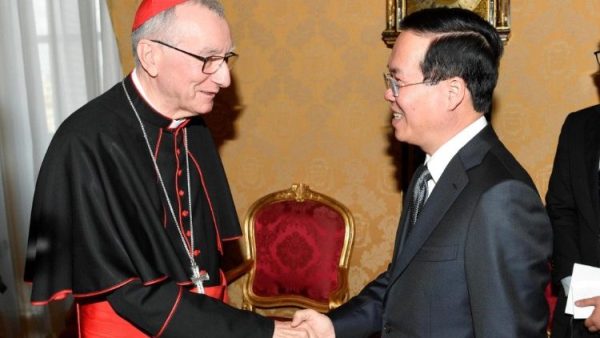Cardinal Parolin: Holy See-Vietnam agreement represents new beginning
 Cardinal Secretary of State Pietro Parolin comments on the institution of a Pontifical Resident Representative in Vietnam, affirming both parties' intention to continue to work together "under the sign of mutual respect and mutual trust."
Cardinal Secretary of State Pietro Parolin comments on the institution of a Pontifical Resident Representative in Vietnam, affirming both parties' intention to continue to work together "under the sign of mutual respect and mutual trust."
The Holy See and Vietnam have reached an agreement on the status of the Resident Papal Representative in the Asian country.
Speaking with Vatican Media, Cardinal Secretary of State Pietro Parolin retraced the various passages that brought to the accord, inspired by two expressions: "one used by Pope John XXIII: 'to know each other in order to esteem each other' and the other offered by Pope Francis: 'to initiate processes and not occupy spaces.'"
Paths of dialogue
Cardinal Parolin recalled how "the opening of relations with Vietnamese Authorities dates back to 1989, when Cardinal Roger Etchegaray, then President of the Pontifical Council for Justice and Peace, was able to make an official visit to Vietnam."
“John Paul II's desire was to open paths of dialogue through the themes of justice and peace, characteristic of the Church's daily teaching and witness.”
The Holy See would then begin the practice of an annual visit "devoted partly to contacts with the government and partly to meetings with diocesan communities."
In December 2009, Vietnamese President Nguyen Minh Triet met with Pope Benedict XVI.
"Mutual respect"
The encounter led to the formation of a Vietnam-Holy See Joint Working Group, "which paved the way for the appointment of a non-resident Pontifical Representative based in Singapore in the person of Archbishop Leopoldo Girelli on 13 January 2011."
Cardinal Parolin highlighted the "mutual respect and willingness to move forward" as essential values to reinforce the relationship between the Holy See and Vietnam.
"It should be noted that the Bishops' Conference was always involved in this process and offered its own reflections and evaluations," the Cardinal Secretary of State added.
“It then proceeded step by step, not seeking immediately the final result but favoring a gradual harmonization of the principle of religious freedom with local laws and customs.”
Citizens of heaven and earth
This gradual mediation has eventually brought to a "convergence" in the final agreement, aimed at ensuring "that the Pontifical Resident Representative has the conditions to exercise his ministry of legation with the local Church and Vietnamese Authorities, as well as to maintain relations with the Diplomatic Representations present in Vietnam."
Cardinal Parolin also emphasized the principle of living the Gospel, a value "that as early as the 2nd century A.D. indicated how Christians, in their way of living, manifest that they are at the same time citizens of heaven and earth."
The dialogue between the two states' delegations has also taken into account "the life of the local Church," respecting the "freedom of belief and religion."
Improve relations
Concretely, Cardinal Parolin described the figure of the Resident Pontifical Representative as a "bridge" with the duty to "further improve relations between Vietnam and the Holy See."
Connections will be reinforced through participation in the local Church celebrations and initiatives and "aspects that we could call civil."
In fact, "the Resident Pontifical Representative, as is the case with Nuncios, has the task of strengthening the friendly relations between the Holy See and the Government of Vietnam and will be able to participate in the ordinary meetings of the Diplomatic Corps and receptions, as well as have personal meetings with the Diplomats."
All of this will happen "in compliance with the law of the country and in the spirit of mutual trust and the good bilateral relations that have taken place until now," Cardinal Parolin noted.
A new beginning
Concerning the future relationships between Vietnam and the Holy See, the Cardinal Secretary of State highlighted a quality that "has always struck me positively about Vietnamese people, perhaps because it is something I breathed in as a child in my homeland: humble industriousness."
Cardinal Parolin stressed his experience of "a profound aptitude for work, not just manual labor, but understood as a commitment to everything one does," parallel "to humble and respectful, though proud, attitude, able to adapt to any situation, as does the bamboo plant, which bends but does not break."
“The future calls us to a path to continue on together, without the pretension or rush to reach some other goal, but with the willingness of those who want to confront each other to find the best.”
"The Agreement represents not just a finish line," Cardinal Parolin concluded, "but a new beginning, under the sign of mutual respect and mutual trust."
Edoardo Giribaldi
Source: vaticannews.va
